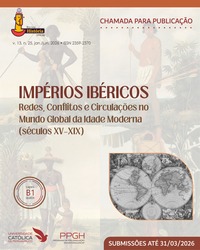A Grande Guerra: a Primeira Guerra Mundial (1914-2014), Evento e Memória
DOI:
https://doi.org/10.25247/hu.2014.v1n1.pp.%2041-55Palavras-chave:
Primeira Guerra Mundial, evento, memória.Resumo
A Primeira Guerra Mundial (1914-1918) marcou profundamente a história do século XX, não só pelos trágicos eventos que envolveram milhões de pessoas – determinando o fim de impérios seculares e o nascimento de novas realidades estatais –, mas também, e sobretudo, pela memória destes eventos, que deixaram abertas questões políticas, econômicas e culturais, das quais nasceram outras guerras ao longo do século. Neste artigo, o autor revisita, de maneira breve, os acontecimentos da Primeira Guerra Mundial, oferecendo uma periodização por meio da qual destaca o caráter global e as articulações da Grande Guerra, especialmente à luz dos tantos sujeitos que foram envolvidos após a estação inicial (verão-outono 1914), na qual muitos foram levados a cultivar a ilusão de uma guerra curta e vitoriosa. Esta ilusão foi substituída por novos projetos para a conclusão da guerra, enquanto em muitos lugares, assistimos a criação de longas linhas de trincheiras, que pareciam imóveis, causando grande frustração nos combatentes. Tanto para os participantes, quanto para os locais de confrontos, a Grande Guerra foi realmente “mundial”, mesmo que tenha sido a Europa a ter a maior quantidade de mortes e devastação, como foi posto em evidência quando da reconstrução de momentos-chave da guerra: desde o avanço alemão ao ocidente (1914), passando pelas movimentações ao front russo (1914-1916), a sangrenta batalha de Verdun (1916), a Revolução Russa (1917) até o colapso das Potências Centrais (1918). O artigo é concluído com uma breve exposição bibliográfica, onde são indicadas as publicações mais recentes – muitas dos quais editadas por ocasião do centenário do início da guerra (1914-2014) –, bem como uma série de estudos, considerados cruciais para o conhecimento histórico da Primeira Guerra Mundial.
Abstract:
The First World War (1914-1918) left a significant mark on the twentieth century’s history, not only by the tragic events that involved millions of people - meaning the end of secular empires and the birth of new state realities - but also, and above all, by the memory of these events, which left open issues of political, economic and cultural importance; issues that have begotten other wars throughout the century. In this article, the author revisits, briefly, the events of the First World War, offering a timeline by which he highlights the global nature of the Great War and its joints, especially in light of the numerous individuals who were involved after the initial season (summer-Fall 1914), during which many were brought to cultivate the illusion of a short, victorious war. This illusion was replaced by new projects aiming the war’s conclusion; but in the same time as these projects, in many places, people witnessed the creation of long lines of trenches, which seemed immovable, and for that, caused great frustration for fighters. Both for the participants and for the locations of clashes, the Great War was actually seen as “worldwide”, even if Europe was to have the largest number of deaths and devastation, as was made evident when was made a reconstruction of the war’s key moments: from the German advance in the west (1914), through the movements to the Russian front (1914-1916), the bloody battle of Verdun (1916), the Russian Revolution (1917), until the collapse of the Central Powers (1918). The article is concluded by a brief bibliographic exhibition, which details the most recent publications - many of them published for the centenary of the War’s beginning (1914-2014) - as well as a number of studies, considered crucial to the historical knowledge of the First World War.
Downloads
Downloads
Edição
Secção
Licença
Concedo a Revista História Unicap o direito de primeira publicação da versão revisada do meu artigo, licenciado sob a Licença Creative Commons Attribution (que permite o compartilhamento do trabalho com reconhecimento da autoria e publicação inicial nesta revista).
Afirmo ainda que meu artigo não está sendo submetido a outra publicação e não foi publicado na íntegra em outro periódico e assumo total responsabilidade por sua originalidade, podendo incidir sobre mim eventuais encargos decorrentes de reivindicação, por parte de terceiros, em relação à autoria do mesmo.
Também aceito submeter o trabalho às normas de publicação da Revista História Unicap acima explicitadas.
















 A História Unicap está licenciada com uma licença
A História Unicap está licenciada com uma licença 